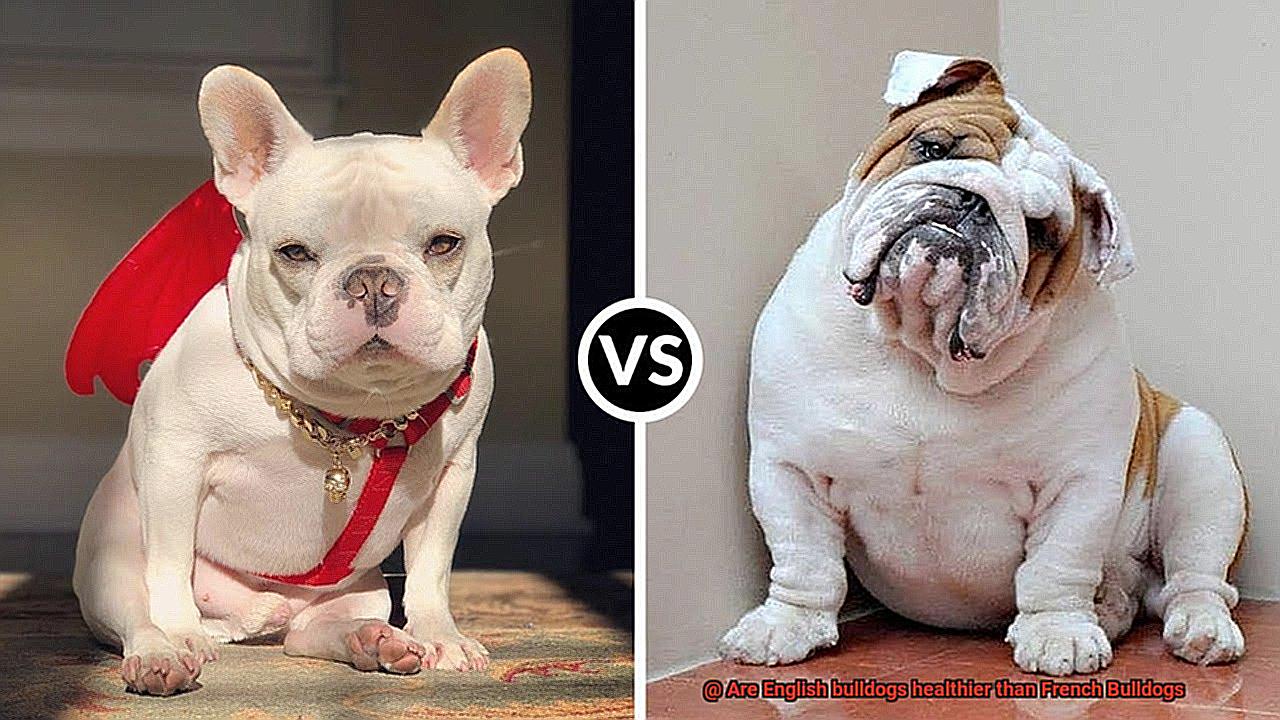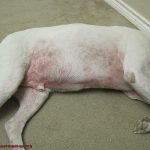Are English bulldogs healthier than French Bulldogs?
Today, we’re diving headfirst into the great bulldog health debate. Picture this: wrinkly faces, squishy bodies, and a whole lot of cuteness. Yes, we’re talking about English Bulldogs and French Bulldogs – two breeds that have stolen our hearts with their undeniable charm. But amidst all the adoration, there’s one burning question on everyone’s minds: which breed is healthier?
Get ready to uncover the truth as we embark on a thrilling journey through the world of bulldog health. We’ll unravel fascinating facts and essential insights that’ll help you make an informed decision when it comes to choosing between these lovable pooches. So buckle up, folks, because things are about to get real.
Now, before we dive in too deep, let’s remember that every dog is unique. Just like humans, they come with their own quirks and individual health needs. So while we explore the differences between English Bulldogs and French Bulldogs today, always consult your trusty veterinarian for tailored advice specific to your furry friend.
So grab a cuppa and join us on this exciting adventure as we decode the health traits of these delightful bulldog breeds. By the end of this journey, you’ll be armed with all the knowledge you need to make a responsible choice when it comes to bringing home your new four-legged companion.
Let’s get started.

Differences between English and French Bulldogs
Contents
- 1 Differences between English and French Bulldogs
- 2 Common Health Issues in Both Breeds
- 3 Respiratory Problems in English Bulldogs
- 4 Obesity Risk for French Bulldogs
- 5 Genetic Disorders in Both Breeds
- 6 Proper Care and Maintenance of Both Breeds
- 7 Taking Preventative Measures to Improve Health
- 8 Determining the Healthier Breed
- 9 Conclusion
English Bulldogs and French Bulldogs are beloved breeds known for their unique physical characteristics and charming personalities. However, there seems to be a persistent belief that English Bulldogs are inherently healthier than their French counterparts.
In this blog post, we will explore the truth behind this notion and shed light on the health concerns associated with both breeds.
Understanding Brachycephalic Breeds:
Both English Bulldogs and French Bulldogs belong to the brachycephalic breed category, characterized by their short snouts and flat faces.
While these adorable features contribute to their distinctive appearance, they also come with potential health challenges.
Breathing Difficulties:
It is true that both breeds can experience breathing difficulties due to their brachycephalic features. However, English Bulldogs are often perceived as having more pronounced respiratory issues. Their shorter snouts and narrowed airways can lead to snoring, snorting, and difficulty breathing during exercise or in hot weather.
French Bulldogs, while also prone to respiratory problems, generally have fewer breathing issues compared to their English counterparts.
Weight Management:
Obesity is a concern for both English and French Bulldogs. English Bulldogs tend to be less active and may struggle with weight gain if not provided with regular exercise and a balanced diet. This excess weight can exacerbate their breathing difficulties.
French Bulldogs, despite being more active than their English counterparts, can also be susceptible to obesity if their exercise and diet are not properly regulated.
Genetic Disorders:
Both breeds have specific genetic disorders they may be predisposed to. English Bulldogs are more prone to hip dysplasia, skin allergies, heart problems, and eye issues such as cherry eye and entropion.
On the other hand, French Bulldogs have a higher risk of spinal disorders like intervertebral disc disease and genetic diseases such as Von Willebrand’s disease.
Preventive Measures:
While it is difficult to determine definitively which breed is healthier overall, it is crucial for owners of both English and French Bulldogs to take preventive measures to ensure their well-being. Regular veterinary check-ups, a balanced diet, exercise, weight management, and avoiding extreme temperatures can help improve the overall health of both breeds.
Consulting with Breed Experts:
If you are considering adding an English or French Bulldog to your family, it is important to consult with reputable breeders or veterinarians who specialize in these breeds. They can provide valuable insights and guidance based on their expertise and first-hand experiences.

Common Health Issues in Both Breeds
When it comes to health, English bulldogs and French bulldogs have a lot more in common than you might think. While there are some differences between the two breeds, they both face similar health issues that owners should be aware of. So, let’s dive in and explore these common health concerns.
- Brachycephalic Syndrome: This is a condition that affects both English and French bulldogs due to their unique facial structure. The shortened muzzle and flat face can lead to breathing difficulties, snorting, wheezing, and even heat intolerance. It’s important for owners to provide a cool and comfortable environment for their dogs, especially during hot weather, and avoid excessive physical exertion.
- Hip Dysplasia: This is a common joint problem that affects both breeds. It occurs when the hip joint doesn’t develop properly, leading to instability, pain, and lameness. Regular exercise, a balanced diet, and weight management can help reduce the risk of hip dysplasia in both English and French bulldogs.
- Skin Problems: Due to their wrinkled skin and excessive folds, both English and French bulldogs are prone to dermatitis, which is inflammation of the skin. These skin irritations often occur in the folds and creases of their face, neck, tail, and other areas with skin folds. Regular cleaning and drying of these areas can help prevent infections and discomfort.
- Allergies: Both breeds are susceptible to allergies, which can manifest as itching, redness, rashes, and even ear infections. Identifying and avoiding allergens, such as certain foods or environmental triggers, can help manage these allergies. In severe cases, veterinarians may recommend allergy testing and prescribe medications to alleviate symptoms.
- Eye Problems: English bulldogs and French bulldogs can also experience various eye problems. Cherry eye, which is the prolapse of the third eyelid, and entropion, where the eyelids roll inward, are common issues. These eye conditions can cause discomfort, irritation, and vision impairment. Regular eye examinations by a veterinarian are essential to detect and address any potential eye problems early on.

Respiratory Problems in English Bulldogs
English Bulldogs are beloved for their charming personalities and distinctive pushed-in faces. However, their brachycephalic features can make them more prone to respiratory problems. In this article, we will explore the common respiratory issues English Bulldogs face and provide tips on how owners can help manage and improve their furry friends’ respiratory health.
Identifying the Problem:
One of the most prevalent respiratory problems in English Bulldogs is brachycephalic airway obstructive syndrome (BAOS). This condition is characterized by various anatomical abnormalities that restrict airflow, such as narrow nostrils, an elongated soft palate, and a narrow trachea. These abnormalities can lead to symptoms like snoring, wheezing, coughing, and difficulty breathing.
Taking Proactive Measures:

- Regular Veterinary Check-ups: Schedule routine visits to your veterinarian to monitor your English Bulldog’s respiratory health. Early detection of any issues can help prevent further complications.
- Weight Management: Maintaining a healthy weight is crucial for English Bulldogs. Obesity can worsen respiratory problems by putting additional strain on their already compromised airways. Consult your veterinarian for a proper diet and exercise plan tailored to your bulldog’s needs.
- Environmental Considerations: Ensure your home environment is conducive to your English Bulldog’s respiratory well-being. Avoid dusty or smoky areas, as these irritants can exacerbate breathing difficulties.
- Temperature Regulation: English Bulldogs are more susceptible to heat exhaustion due to their compromised breathing. Provide plenty of fresh water, shade, and limit exercise during hot weather to prevent overheating.
- Surgical Interventions: In severe cases, surgical procedures may be necessary to correct certain anatomical abnormalities associated with BAOS. Consult with a specialized veterinarian to determine if your English Bulldog would benefit from nostril widening or soft palate resection.
French Bulldogs vs. English Bulldogs:
While French Bulldogs also have brachycephalic features, studies suggest that English Bulldogs may have a higher prevalence of respiratory problems. The exaggerated facial structure and larger size of English Bulldogs may contribute to their increased susceptibility. However, it’s important to note that each dog is unique, and individual care should be tailored accordingly.
Obesity Risk for French Bulldogs
In this article, we’ll explore the risks associated with obesity in French Bulldogs and provide you with some expert tips on how to keep your furry friend fit and fabulous.
Why Are French Bulldogs Prone to Obesity?
French Bulldogs, with their cute little faces and insatiable appetite for food, are at a higher risk of becoming overweight or obese. A combination of genetic predisposition, love for food, and lack of exercise contributes to their susceptibility. On top of that, these adorable pooches have a slower metabolism compared to English Bulldogs, making it easier for them to pack on the pounds.
The Dangers of Obesity in French Bulldogs:
Obesity can lead to a whole host of health problems for our beloved Frenchies. Joint problems, heart disease, respiratory difficulties – you name it. That’s why it’s crucial for owners to take proactive measures to prevent their dogs from becoming overweight.
Tips to Keep Your French Bulldog Fit:
- Balancing Act: Feeding your Frenchie a balanced and portion-controlled diet is key. Consult with your veterinarian to determine the appropriate amount of food for your dog’s age, weight, and activity level. Remember, treats should be given sparingly.
- Get Active: Regular exercise is essential for keeping those extra pounds at bay. Take your Frenchie for daily walks, engage in playtime sessions, and stimulate their minds with interactive toys or puzzle games. Not only will this help them burn calories, but it will also keep them mentally stimulated and happy.
- Vet Knows Best: Don’t hesitate to seek advice from your veterinarian. They can provide valuable insights into your Frenchie’s specific dietary needs and recommend an exercise routine tailored to their individual requirements.
- The Scale Speaks: Regularly monitor your Frenchie’s weight and adjust their diet and exercise regimen accordingly. If you notice any significant weight gain, it might be time to cut back on the treats or increase their activity level.
Genetic Disorders in Both Breeds
When it comes to owning a dog, their health should be a top priority. It’s essential to be aware of the genetic disorders that may affect your furry friend. In this article, we will explore the genetic disorders common to both English Bulldogs and French Bulldogs. By understanding these conditions, you can take proactive steps to ensure your dog’s well-being.
Brachycephalic Airway Syndrome:
Both English Bulldogs and French Bulldogs are brachycephalic breeds, meaning they have short muzzles and flat faces. While this characteristic adds to their adorable appearance, it also puts them at risk of Brachycephalic Airway Syndrome.
This syndrome encompasses a range of respiratory issues, including narrowed nostrils, elongated soft palate, and a small windpipe. These anatomical abnormalities can make it challenging for affected dogs to breathe properly, especially during exercise or in hot weather.
Hip Dysplasia:
Another genetic disorder that affects both breeds is hip dysplasia. This condition occurs when the hip joint does not develop properly, leading to instability and degeneration over time. Hip dysplasia can cause pain, lameness, and even arthritis in affected dogs. It’s crucial to monitor your dog’s mobility and consult with your veterinarian if you notice any signs of discomfort.
Skin Allergies and Infections:
English Bulldogs, with their folds and wrinkles, are prone to skin allergies and infections. These areas can trap moisture and bacteria, leading to dermatological issues such as redness, itching, and infection. Regular cleaning and maintenance of these skin folds are essential to prevent these problems.
Eye Problems:
French Bulldogs are known for their expressive eyes, but they are also susceptible to various eye problems. Cataracts, cherry eye (prolapse of the third eyelid gland), and corneal ulcers are some of the conditions that can affect French Bulldogs. These eye problems can result in vision impairment or even blindness if left untreated.
Intervertebral Disc Disease (IVDD):
French Bulldogs are also prone to Intervertebral Disc Disease (IVDD). This condition affects the spinal discs, leading to degeneration or rupture. IVDD can cause pain, paralysis, and loss of motor function in affected dogs. It’s essential to be mindful of your French Bulldog’s activity level and provide them with an environment that minimizes the risk of spinal injuries.
Proper Care and Maintenance of Both Breeds
English Bulldogs and French Bulldogs are beloved breeds known for their unique physical characteristics and charming personalities. However, due to their distinct features and potential health concerns, it is important to provide them with proper care and maintenance. In this section, we will discuss the necessary steps to ensure the well-being of both breeds.
- Regular Cleaning of Facial Folds: English Bulldogs have adorable wrinkled skin that requires regular cleaning to prevent infections. Use a damp cloth or specialized wipes to gently clean the folds, paying close attention to any redness or odor.
- Maintaining a Cool and Well-Ventilated Environment: Both English Bulldogs and French Bulldogs have short noses, making them susceptible to respiratory problems. Ensure they have access to a cool and well-ventilated environment, especially during hot weather, to avoid overheating and breathing difficulties.
- Balanced Diet and Exercise: English Bulldogs are prone to obesity, so it is essential to provide them with a balanced diet and regular exercise. Consult with your veterinarian to determine the appropriate amount of food and exercise for your English Bulldog’s specific needs. French Bulldogs are generally more active than their English counterparts but still require regular exercise to prevent weight gain.
- Regular Vet Check-ups: Both breeds are prone to certain genetic health conditions, such as hip dysplasia, patellar luxation, and allergies. Regular vet check-ups and screenings are crucial for early detection and management of these conditions.
- Grooming: Regular grooming is important for both breeds. Brush their coats regularly to maintain their health and prevent matting. Additionally, don’t forget about dental care – brush their teeth or schedule regular dental cleanings to prevent dental diseases.
- Socialization and Mental Stimulation: Both English Bulldogs and French Bulldogs thrive on human interaction and can become bored or anxious if left alone for extended periods. Provide them with toys, training sessions, or interactive games to keep them mentally stimulated and prevent behavioral issues.
- Heat Sensitivity: Due to their brachycephalic structure, both breeds are sensitive to heat. Avoid exercising them in hot weather and provide plenty of fresh water to prevent overheating. It is essential to keep them in a cool environment, especially during the summer months.
- Clean and Safe Environment: Regularly clean their living area and provide a comfortable bed to prevent infections or discomfort. Additionally, ensure they are safe from any household hazards that may pose a risk.

Remember, each English Bulldog and French Bulldog is unique, so it is important to adapt these care and maintenance guidelines to fit their individual needs. By providing proper care and attention, you can ensure that your furry friend remains healthy, happy, and thriving for years to come.
Taking Preventative Measures to Improve Health
English Bulldogs and French Bulldogs are beloved breeds with their own unique health concerns. But fear not. By taking preventative measures, you can ensure your furry friend lives a long, healthy life. In this blog post, we’ll dive into the key areas of nutrition, exercise, grooming, veterinary care, and responsible breeding practices to keep your bulldog in tip-top shape.
Nutrition:
- Feed high-quality dog food formulated for bulldogs.
- Monitor food intake and avoid overfeeding to prevent weight gain.
- Consult with a veterinarian to ensure all nutritional needs are met.
Exercise:
- Engage in daily exercise such as walks or playtime.
- Keep an eye on the weather as bulldogs can struggle with intense physical activity in hot conditions.
- Opt for cooler times of the day or air-conditioned environments for exercise.
Grooming and Hygiene:
- Regularly clean facial folds, tail folds, and other skin creases to prevent infections.
- Keep ears clean and dry to reduce the risk of ear infections.
- Maintain dental hygiene through regular brushing and providing chew toys.
Veterinary Care:
- Schedule routine check-ups to monitor your bulldog’s health and catch any issues early on.
- Ensure vaccinations are up to date to protect against common diseases.
- Discuss breed-specific health concerns with your vet.
Responsible Breeding Practices:
- Choose breeders who prioritize health screening and select breeding pairs with minimal health issues.
- Avoid breeders who prioritize appearance over health.
- By supporting responsible breeding practices, you can help reduce the risk of genetic health issues in future generations.
Determining the Healthier Breed
When considering owning a bulldog, it is crucial to determine which breed is healthier. This decision can have a significant impact on your pet’s overall health, veterinary bills, and overall happiness. Let’s explore the importance of determining the healthier breed and what factors to consider when making this decision.
Genetic Predispositions: English Bulldogs vs. French Bulldogs
Both English Bulldogs and French Bulldogs share a common genetic predisposition for certain health conditions due to their brachycephalic (short-nosed) facial structure. However, there are some differences between the two breeds.
English Bulldogs tend to have more severe breathing problems and are more susceptible to respiratory issues. This can lead to difficulties in regulating body temperature and increased risk during exercise or hot weather. On the other hand, French Bulldogs may have fewer respiratory problems but are more prone to certain joint and spinal issues.
Common Health Issues: English Bulldogs vs. French Bulldogs
It is essential to be aware of the common health issues that each breed may face. English Bulldogs often experience skin problems, allergies, eye issues, and gastrointestinal problems. These conditions require regular veterinary care and proper management.
French Bulldogs commonly face issues such as hip dysplasia, intervertebral disc disease, and patellar luxation. These conditions can cause pain and mobility issues for your pet.
Regular Veterinary Check-ups and Preventive Care
Regardless of which breed is considered “healthier,” responsible ownership includes providing proper healthcare, nutrition, exercise, and environment for any bulldog.
Regular veterinary check-ups are vital to monitor your bulldog’s health and catch any potential issues early on. Preventive care such as vaccinations, parasite control, dental care, and regular exercise can help keep your bulldog healthy.
Consult with Professionals
Determining the healthier breed requires gathering information from professionals who have extensive knowledge of both English bulldogs and French Bulldogs. Consult with veterinarians or breeders who can provide specific insights into the health concerns of individual dogs.
QeDBoYN3UdI” >
Conclusion
In conclusion, when comparing the health of English bulldogs and French bulldogs, it is evident that there are some notable differences. English bulldogs tend to have more health issues due to their breeding history and genetic predispositions.
They commonly suffer from respiratory problems, skin conditions, and joint ailments. On the other hand, French bulldogs are generally considered to be healthier with fewer severe health concerns. However, they still have their own set of potential issues such as eye problems and spinal disorders.
It is important to note that both breeds require proper care and attention to ensure their well-being. Regular veterinary check-ups, a balanced diet, exercise, and a comfortable living environment are crucial for maintaining their overall health.
When considering which breed may be a better fit for you, it is essential to weigh the pros and cons carefully. While English bulldogs may require more medical attention and potentially higher healthcare costs, their loyal and affectionate nature can make them wonderful companions. On the other hand, French bulldogs’ relatively better health status coupled with their playful and friendly temperament can also make them great family pets.
Ultimately, the decision between an English bulldog or a French bulldog should be based on your lifestyle, preferences, and willingness to provide appropriate care for any potential health issues that may arise. Consulting with reputable breeders or professionals in the field can further assist you in making an informed choice.




